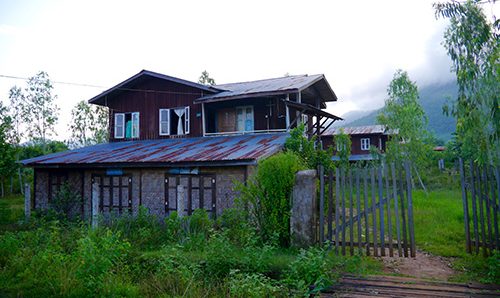- SIWI – Leading expert in water governance
- /
- Latest
- /
- Myanmar’s (Burma) landmark election: decisive for Myitsone dam
Myanmar’s (Burma) landmark election: decisive for Myitsone dam
Today, activists and local residents (both displaced and resettled) gathered in the Myitsone confluence area for an annual protest to the Myitsone dam project. The suspension of the project – put in place by the current President, expires at the change of government.

The first open election since 1990, Myanmar’s (Burma) general election will take place on 8 November. A number of electoral process shortcomings raise questions of legitimacy, and expectations of reform after the election are low – except for the Myitsone dam project. Responding to nationwide protests, President U Thein Sein suspended the project in 2011. This suspension expires in November.

Myanmar (Burmese) activists protest against the Myitsone Dam, near the Myanmar (Burmese) Embassy in Malaysia, on 2011 September 22. Photo credit: the Nation media
The largest of seven cascade dams planned on the Upper Irrawaddy Basin (capacity of 6,000 MW), the Myitsone dam is a joint development between the Myanmar Ministry of Electric Power (15%), China Power Investment (CPI, 80%) and Asia World Company (5%). It is located in the headwaters of the Irrawaddy River, 37 km north of the Myitkyina – the capital of the Kachin State. This is also where civil war between the Kachin Independence Organization (KIO) and the Myanmar Armed Forces (Tatmadaw) is ongoing.
The Myanmar (Burma) government has not given a clear indication on the future of the dam. CPI wishes to resume the project after the election, claiming to have already paid for 60% of total project investment ($3.6 billion) prior to the suspension.
In 2002, Myanmar (Burma) and China signed the Bilateral Investment Treaty which includes protection of investment and compensation for loss of investment and expropriation. Legal action and diplomatic rows are therefore likely should the project be cancelled.
Solving the Myitsone dam is part of a complex puzzle of water and politics. The Myitsone dam suspension is a prime example of a water development project having far-reaching domestic and international political implications. The future development of the project and the politics around it will be interesting to follow during the upcoming election and political transition in Myanmar (Burma).
It is only one of many large-scale water development projects in the country where hydropower potential is estimated to be 100 GW, and a mere 3 GW is so far exploited (International Hydropower Association). For a country experiencing extreme energy poverty, hydropower development offers many benefits. The road to sustainable hydropower however, appears to be a bumpy one.
Many actors have protested against the dam project in recent years, including KIO, who opposed the dam because of its strategic importance and resettlement policy. Environment and conservation activists, the Kachin activists and the political opposition have also campaigned against the dam, including opposition leader and Nobel Peace Prize Laureate, Daw Aung San Suu Kyi, who spoke out against the dam in her speech “Save the Irrawaddy”, in August 2011.

Opposition leader and a Nobel Peace Prize Laureate, Aung San Suu Kyi posing in front of a poster “Save Our River”. Photo credit: Soe Than Win/AFP/Getty Images
The Myitsone dam suspension is considered by many to be a rare triumph over disastrous foreign investment projects. Leading activist Myint Zaw was awarded the Goldman Environmental Prize in 2015 for successfully mobilizing a nation-wide movement.
The fate of the project is however, most likely to be decided by the next president elected in November. While none of the political parties have yet raised the issue, the Myitsone dam has the potential to be politically explosive when it comes up for a discussion under the new government.
This project continues be unpopular with the Myanmar (Burma) public, who share a strong anti-Chinese sentiment due to Beijing’s role in supporting the former junta and exploiting the country’s rich natural resources (Plus initial reports suggest 90% of the electricity generated would be sent to China). However, the Myanmar (Burma) government needs to be careful to balance the domestic anti-Chinese sentiment with the need for a strategic, economic partnership with its northern neighbor and a sustainable energy supply.

A house in Aung Min Thar resettlement village. The village is equipped with a school, church and hospital and receives electricity for 24-hour which is rare in rural Myanmar (Burma), thanks to CPI. Photo credit: Kyungmee Kim
Most recent

SIWI Amman and UNICEF host Libya representatives for WASH exposure visit
- Water, Sanitation and Hygiene (WASH)
- Water governance

Water and land: Partners in climate mitigation
- Water in landscapes
- Wetlands
- Water governance

What is the role of water in rural and urban school facilities?
- Water, Sanitation and Hygiene (WASH)
- Water in landscapes
- Water governance
- Gender and water

Taking root: locally driven forest landscape restoration
- Water in landscapes
- Wetlands
- Groundwater
- Resilience through water

What does it take to build peaceful water cooperation? 3 questions to Julienne Ndjiki and Katie Goldie-Ryder

How can we build peace over shared waters? 3 questions to Kerry Schneider

The world can’t afford a water dry Summit of the Future
